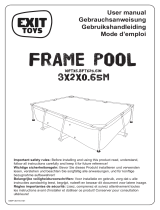17
For detailed instructions on how to use the chemicals, contact your local pool dealer
and provide them with information on the volume of water in your pool and a water
sample if necessary. Based on this information, he or she will be able to give you
informed advice on which chemicals to purchase, the quantities of chemicals to
purchase and how to use each chemical safely and effectively.
2. Avoid direct contact of insufficiently dissolved chlorine with the pool surface.
Chlorine in granular or tablet form must first be dissolved in a bucket of water; the
dissolved chlorine should then be poured slowly and evenly into the pool water from
various points around the perimeter of the pool.
DANGER: Do not pour water into chemical agents. Instead, always add chemicals to the
water. Also, as a rule, do not mix individual chemicals together; instead, apply chemicals
to the pool separately and allow them to disperse throughout the pool before adding
another type of chemical.
3. We recommend purchasing a test kit and regularly checking the optimal PH and
chlorine levels in your pool water. Contact your local pool accessories dealer for
advice on purchasing and using the most appropriate test kit.
NOTE: Excessive chlorine or low (acidic) pH can damage the pool surface; if this is found
during testing, take appropriate action as soon as possible. To make it easier to remove
large amounts of dirt from the pool and keep the inside of the pool clean, a Prompt-Set
pool maintenance kit is available which includes a scoop and vacuum cleaner for
connection to a garden hose. Maintenance kits are provided as a bonus with larger
pools and can also be purchased separately as accessories. If you need advice on repairs
during the lifetime of your pool, contact your local after-sales service centre.
4. Every two weeks (or more frequently at intervals of intensive operation) check
whether the cartridge of any filter pump needs to be cleaned or replaced. If the
cartridge is no longer white, try showering it with a strong stream of water from a
garden hose. If the cartridge cannot be cleaned in this way, it must be replaced.
Failure to clean and/or replace your cartridge regularly will reduce the efficiency of
your filter pump and could shorten its life.
5. If your pool comes with a cover, always cover the pool with the cover when you are
not using it. This will prevent wind or other natural forces from bringing debris into
the pool and also prevent the pool from overflowing with rainwater.
6. Always remind your family members and friends to wash or rinse any dirt or
sunscreen off their hands, feet and body before entering the pool.
7. It is essential to monitor the condition of the screws and pool equipment (e.g.
corrosion stains).




















